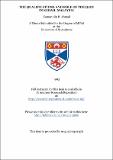The qualifications and role of the Qadi in Kedah, Malaysia
Abstract
Sharī'a has never ignored the need of and the function of judge. This institution, as developed in the early age of Islam, aimed to establish the rule of God on earth, to decide and explain the law according to the Islamic Law. It appears that anybody could be appointed as a judge but he was required to adopt certain criteria laid down by the fuqahā' based on the Qur'ān, Sunna. Ijmā and Oiyās. The requirements needed to be a judge in this Islamic approach are discussed widely in this study. This study also attempts to show and demarcate the limits of the power of judges in Sharī'a Courts in Kedah, Malaysia. It also shows how Islam established its system of justice in Malaysia. Some questions or hypotheses are examined, the first concerns whether or not people who lack capabilities should be allowed to be appointed judge. The second concerns whether or not the Islamic judicial system follows the Sharī'a in terms of punishment and procedure. The historical and theoretical settings in every age since the pre-Islamic to the 'Abbasid period are also presented. The situation of judge in Sharī'a Court in Kedah, Malaysia is also emphasised, beginning with the developments of the Sharī'a Court and the powers and duties of a judge according to the Malaysian constitutional system. Finally the subjects which have been discussed in separate chapters are actually related to each other. The whole important discussion is brought together, analysed and a conclusion drawn concerning the various problems raised.
Type
Thesis, PhD Doctor of Philosophy
Collections
Items in the St Andrews Research Repository are protected by copyright, with all rights reserved, unless otherwise indicated.

